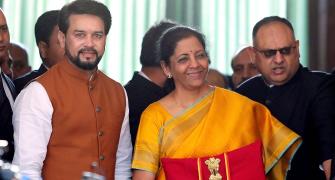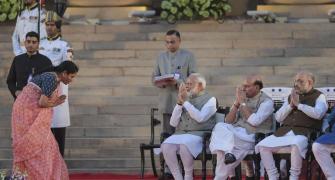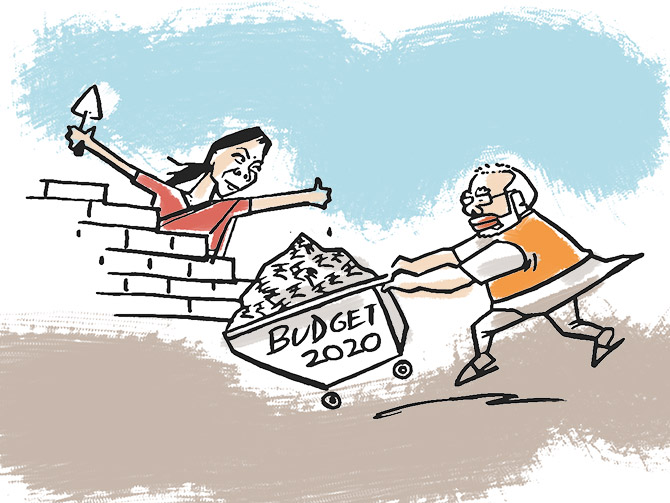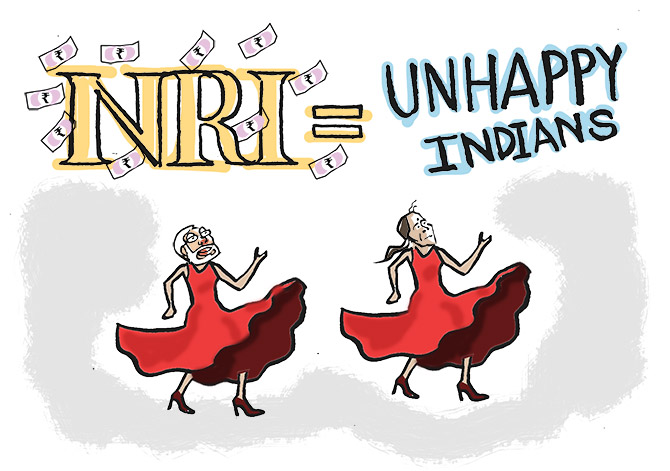'Now, look at the management of the economy. There could be a bad situation, but you must know how to manage it. We had bad situations in 1997...2008. We had a difficult situation in 2013, but they were managed... In the current year, that is 2019-20, you promised a nominal GDP growth of 12 per cent. The year ended with about 8.5 per cent.
'You promised a fiscal deficit of 3.3 per cent; the year will end, according to the Budget document, at 3.8 per cent, but, even that has a big question mark around it. Revenue deficit, you promised 2.3 per cent, the year will end with 2.4 per cent.'
In his speech in the Rajya Sabha during a debate on the Union Budget on February 10, 2020, former finance minister P Chidambaram tore into the government.
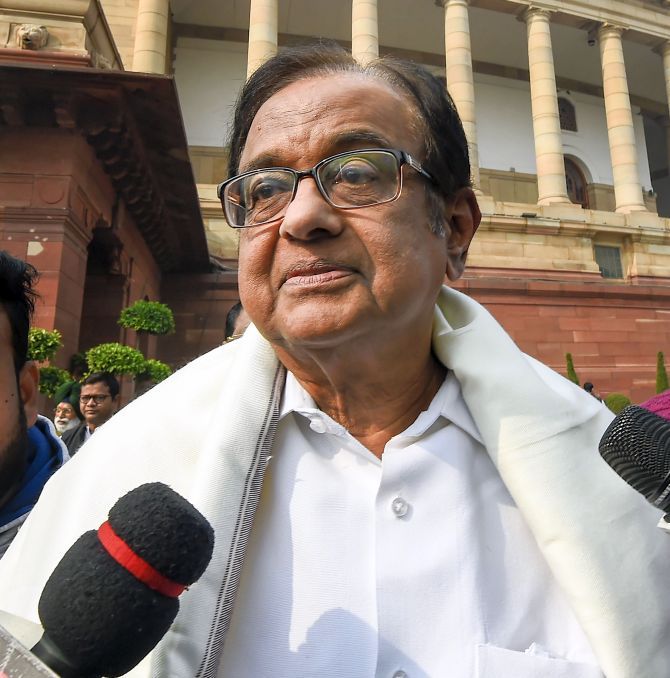
So, what is the state of the economy? I mentioned already six quarters of declining growth rate.
Agriculture is growing at two per cent. Consumer Price Index Inflation, which was 1.9 per cent in January 2019, rose to 7.4 per cent in December 2019. In a matter of 11 months, CPI Inflation has increased from 1.9 per cent to 7.4 per cent.
Food Inflation today is 12.2 per cent. Bank credit is growing at 8 per cent of which non-food credit is at 7 per cent, maybe it has touched 8 per cent in January! Credit to Industry is growing at 2.7 per cent.
Credit to Agriculture over the period December 2014 to December 2019,...the growth rate has declined from 18.3 per cent to 5.3 per cent.
Credit to MSMEs has declined from 6.7 per cent to 1.6 per cent. So, we don't have credit to Agriculture and... MSMEs. Credit to Industry is at a limping rate. Overall credit is only about 8 or 9 per cent.
The result is, it shows up in the quantifiable numbers... During the period April-November 2019, the period for which we have data -- maybe, the (central) government has data for December,...-- just look at these numbers.
Electricity is growing at 0.8 per cent; manufacturing is growing at 0.9 per cent; mining is negative 0.1 per cent; refinery is negative 1.1 per cent; natural gas is negative 3.1 per cent; coal is negative 5.3 per cent, and crude oil is negative 5.9 per cent.
What is left out? If every major industry, that keeps your economy a robust economy, is either near zero or negative..., and if overall IIP (Index of Industrial Production) is 0.6 per cent, that gives you a good picture of the state of the economy... In manufacturing capacity in India across all industries, the capacity utilisation is an average 70 per cent. Some are less, some are more, but the average is 70 per cent.
The plant load factor of thermal power plants for electricity is 55 per cent, which means 45 per cent of your thermal capacity is idle, not because they cannot produce electricity, but there is no consumption of electricity. Nobody wants electricity. If factories are closed, if new factories don't start, why would you consume electricity?
In fact, world over, among the markers for the health of the economy, one of the most important markers is electricity. Lenin said that electricity and education are the two eyes-Es... If your plant load factor rises to 80 per cent, it means your economy is running on all four engines. But if your plant load factor is 55 per cent, it means nearly half of your economy is not running.
For the last six months, export growth, year on year, is negative. For the last eight months, import growth, year on year, is negative. What do you make out of this economy?...
Now let us come to the management of the economy. In fact, for the first couple of years after they came to power, they said, "These are legacy issues, we inherited bad economy", which is factually wrong. But I won't get into that argument now. I think I dealt with it last year. You are in management for the last six years. How long can you blame the previous managers?
Can the UPA turn around and blame Mr Vajpayee's government? Can Mr Vajpayee turn around and blame Mr Narasimha Rao's government? ...please answer. People are asking questions of the current managers, not the past managers.
Now, look at the management of the economy. There could be a bad situation, but you must know how to manage it. We had bad situations in 1997...2008. We had a difficult situation in 2013, but they were managed... In the current year, that is 2019-20, you promised a nominal GDP growth of 12 per cent. The year ended with about 8.5 per cent.
You promised a fiscal deficit of 3.3 per cent; the year will end, according to the Budget document, at 3.8 per cent, but, even that has a big question mark around it. Revenue deficit, you promised 2.3 per cent, the year will end with 2.4 per cent.
If this is worrying, what is projected for next year is even more worrying, although, this is a little technical, I think, it is worthwhile explaining it. Fiscal deficit will rise to 3.8 per cent this year, but, it will fall only to 3.5 per cent next year, a compression of 0.3. But, the revenue deficit from 2.3 per cent will rise this year to 2.4 per cent, and next year, it will not be compressed. It will rise further to 2.8 per cent.
Now, what is the philosophy behind this? The difference between fiscal deficit and revenue deficit, it is what is available for capital expenditure. This year, you will have, according to your numbers, about 1.4 per cent for capital expenditure, but, next year, you will have only 0.7 per cent as capital expenditure.
Assuming these numbers are correct, going forward, just as you compress or plan to compress fiscal deficit, should you not compress revenue deficit also?...
Analysts the world over will note the fact that you will have less money next year for capital expenditure than this year.
You promised to collect net tax revenue of Rs 16,49,582 crore. I will leave out the last digit. Let me give the broad numbers, Rs 16,49,000 crore. Up to December, you have only collected Rs 9,00,000 crore...
Total expenditure you promised to spend in the current year is Rs 27,86,000 crore. Up to December, you have spent only Rs 11,78,000 crore... This strains our credulity, however, and knowing who is sitting as secretary expenditure, I doubt he will let you spend it in the first place. You have no money to spend.
The first order, which the new secretary expenditure passed, obviously, with the consent of the hon. finance minister, is that departing from the earlier rule that in the last quarter, you can spend up to 33 per cent of your Budget, the first order that he passed was, you can only spend this year 25 per cent of your Budget, which means, you have no money... You have masked your situation by numbers. These numbers are not credible...
Now, look at the shortfalls in tax collections... Corporation Tax is short by Rs 1,56,000 crore; personal income tax by Rs 10,000 crore, Customs by Rs 30,000 crore, Union Excise by Rs 52,000 crore and GST by Rs 51,000 crore... And this despite, what everybody in the business believes, you have given extraordinary powers even to the lowest rung officer of the income tax department, excise department, customs department, DRI, not to speak of CBI, ED, and SFIO, and they are issuing notice after notice. This is popularly called tax terrorism.
Edited excerpts from a speech by former Finance Minister and Congress MP P Chidambaram in the Rajya Sabha on the Budget 2020-21, February 10, 2020.



